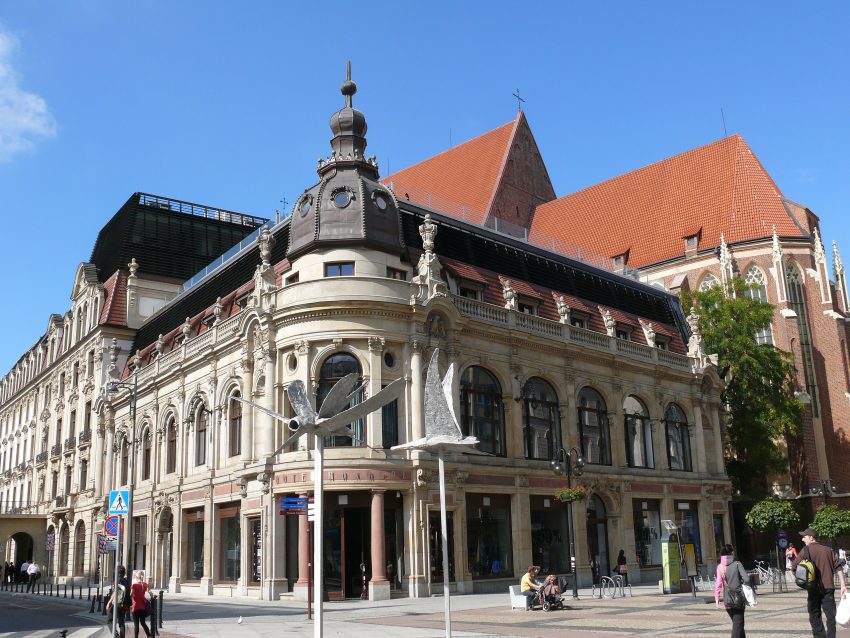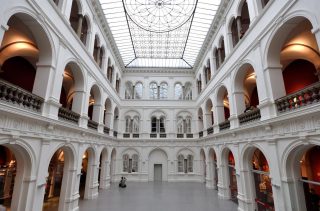Monopol Hotel, Wrocław
Historic Building in Wrocław

Hotel Monopol Wrocław is more than a place to sleep-it's a living piece of the city's history, wrapped in an elegant late-19th-century façade and set right in the centre, close to Wrocław's main cultural venues and Old Town lanes. Even if you are not staying overnight, it's the sort of building that rewards a short detour: step inside for a look at the interiors, take in the atmosphere, and you immediately feel how this address has hosted generations of Wrocław's big moments.
Because it sits just off the Old Town's main flow, it works beautifully as a “heritage pause” between sightseeing stops and café time. For many visitors, it becomes one of the must-see places in Wrocław precisely because it combines architecture, anecdotes, and a tangible sense of continuity, and it's an easy addition to a walking tour of Wrocław when you want something elegant and story-rich without taking up half the day.
Table of Contents
- History and Significance of the Hotel Monopol Wrocław
- Things to See and Do in the Hotel Monopol Wrocław
- How to Get to the Hotel Monopol Wrocław
- Practical Tips on Visiting the Hotel Monopol Wrocław
- Where to Stay Close to the Hotel Monopol Wrocław
- Is the Hotel Monopol Wrocław Worth Visiting?
- For Different Travelers
- FAQs for Visiting Hotel Monopol Wrocław
- Nearby Attractions to the Hotel Monopol Wrocław
History and Significance of the Hotel Monopol Wrocław
Opened in 1892, the Monopol emerged in what was then Breslau as a prestige project-part trade house, part luxury hotel-designed to signal confidence and modernity. Its Art Nouveau and Neo-Baroque touches were not subtle: the building was intended to impress, and the spacious room standards of the era helped cement its reputation as a flagship address in the city.
The hotel’s history mirrors Wrocław’s complicated 20th century. A balcony added above the entrance in the late 1930s became a symbol of political theatre during the German period, then later took on a different meaning when it hosted public performances in the post-war era. It is a small architectural detail that carries an outsized amount of historical weight.
After 1945, the Monopol’s role expanded beyond hospitality into cultural life, hosting major gatherings and welcoming prominent figures from the worlds of art, literature, and public life. The fact that it survived the war years comparatively intact adds to its significance today: it is one of those rare places where you can trace the city’s changing identities through a single, continuous address.
Things to See and Do in the Hotel Monopol Wrocław
Start by treating the exterior as a mini architecture stop. The façade, entrance zone, and that famous balcony are worth a slow look, particularly if you enjoy finding “clues” to how buildings were designed to communicate status and power. Even a few minutes outside can make the later stories feel more real.
Inside, the best approach is simple: step into the lobby and public areas and let the atmosphere do the work. Historic hotels have a particular rhythm-marble, lighting, staff movement, muted conversation-that feels different from standard modern properties, and Monopol is at its best when you allow yourself to notice those details rather than rushing through.
If you want to turn the visit into a proper experience, book something that fits your day: a meal in one of the on-site restaurants, a coffee break that doubles as people-watching, or a wellness session that turns sightseeing into recovery. It is an especially good option on colder months when you want a warm, indoor stop that still feels distinctly “Wrocław.”
How to Get to the Hotel Monopol Wrocław
Hotel Monopol Wrocław is in the city centre at ul. Heleny Modrzejewskiej 2, an easy walk from Rynek and many Old Town landmarks.
Copernicus Airport Wrocław (WRO) is the nearest airport, with straightforward connections into the centre by taxi or public transport. For the best deals and a seamless booking experience, check out these flights to Wrocław on Booking.com.
Wrocław Główny (the main railway station) is close enough that many travellers can reach the hotel by a short taxi ride, tram, or a manageable walk depending on luggage and weather. You can easily check schedules and book tickets through the PKP Intercity website. However, for a smoother experience, we recommend using Omio, which simplifies the booking process and lets you compare prices and schedules all in one place.
If you are arriving by car, plan to use a city-centre garage and walk the final stretch, as street access and parking directly by central hotels can be limited and time-consuming. If you are looking to rent a car in Poland I recommend having a look at Discover Cars, first, as they compare prices and review multiple car rental agencies for you.
Practical Tips on Visiting the Hotel Monopol Wrocław
- Entrance fee: Free to enter the lobby and public areas; spa access and treatments are priced separately.
- Opening hours: Hotel: Daily: 00:00–24:00. Wellness & Spa: Daily: 06:00–24:00.
- Official website: https://monopolwroclaw.hotel.com.pl/hotel-monopol-wroclaw
- Best time to visit: Late morning or mid-afternoon is ideal if you want a calmer feel inside, while early evening suits a restaurant or “smart city break” atmosphere.
- How long to spend: 10-20 minutes works for an architectural and lobby stop; allow 1-2 hours if you are adding a meal or spa time.
- Accessibility: As a historic building, access can be a mix of modern adaptations and older spatial quirks, so it is worth asking staff about the smoothest route if you have mobility needs.
- Facilities: On-site dining and wellness facilities make this a convenient “all-in-one” stop, especially when you want to add comfort and downtime to a busy sightseeing day.
Where to Stay Close to the Hotel Monopol Wrocław
For a culture-heavy itinerary, base yourself in the Old Town/Opera-side centre so you can walk everywhere and enjoy evenings without transport planning; if your priority is early departures and easy transfers, staying closer to Wrocław Główny makes logistics simpler.
For a central, polished stay near major sights, Radisson Blu Hotel, Wrocław is a strong choice for walkability and a smooth, modern-hotel experience. If you want a transport-friendly base that still keeps you close to the centre, Scandic Wrocław works well for station access and quick city movement. For a smart, reliable option that is especially practical for short stays and onward travel, ibis Styles Wrocław Centrum keeps things simple without pushing you far from Old Town plans.
Is the Hotel Monopol Wrocław Worth Visiting?
Yes-especially if you enjoy places where architecture and anecdote meet. Even a brief stop gives you a vivid sense of Wrocław’s layered past, and the hotel’s survival and continued role in city life make it feel authentic rather than staged.
It is also a very practical “quality upgrade” for a sightseeing day. When you want a comfortable indoor pause that still feels like a destination, Monopol delivers atmosphere without demanding a big time commitment.
What Other Travellers Say...
Reviews Summary
Hotel Monopol, at Ulica Heleny Modrzejewskiej 2 in Wrocław, presents itself as a luxury city-centre hotel with a rooftop restaurant and a spa that includes an indoor pool, sauna, steam rooms and a gym; guests praise spacious, clean rooms with modern fittings (some with opera views and electric blinds) and wooden floors, attentive professional service, convenient location within walking distance of the historic centre and nearby public parking, and a widely complimented breakfast and food offering, while some visitors report issues in the wellness area—one described a serious maintenance and hygiene problem in a private spa bathroom—and another suggested breakfast quality and presentation could be improved.
For Different Travelers
Families with Kids
This works best for families as a short, purposeful stop rather than a long linger. Treat it as a quick “historic building moment” with a warm break, then move on before attention spans drop.
If you plan to use the wellness area, keep expectations realistic around pace and noise: it is a more grown-up environment, so it suits families best when children are older or when you are using it for a brief reset rather than a long session.
Couples & Romantic Getaways
For couples, Monopol has classic city-break appeal: a heritage setting, a sense of occasion, and an easy transition from sightseeing into a dressed-up evening. It is ideal when you want something that feels special without needing a complex plan.
If you are choosing one “splurge moment” in Wrocław, this is a good candidate-whether that is dinner, spa time, or simply a slow drink and a stylish pause between Old Town walks.
Budget Travelers
Budget travellers can still enjoy Monopol by approaching it as a free architectural and atmosphere stop. Step in, take in the interiors, and use it as a short highlight that adds texture to your day without committing to premium spend.
If you want the Monopol experience without the full price tag, consider a single targeted choice-one coffee, one dessert, or one pre-booked treatment-then build the rest of your day around Wrocław's many free Old Town walks and viewpoints.
History Buffs
If you care about cities as lived timelines, Monopol is unusually rewarding. It connects Breslau-era prestige, 20th-century political symbolism, and post-war cultural life in a way that feels tangible because the building is still doing what it was built to do.
The most satisfying way to visit is to combine it with nearby cultural sites, then return with the stories fresh in your mind. The hotel becomes a kind of “witness” location that helps you read the wider city more sharply.
FAQs for Visiting Hotel Monopol Wrocław
Getting There
Tickets & Entry
Visiting Experience
Tours, Context & Itineraries
Photography
Accessibility & Facilities
Food & Breaks Nearby
Safety & Timing
Nearby Attractions to the Hotel Monopol Wrocław
- Ostrów Tumski: The cathedral island district that gives you a calmer, older-feeling Wrocław once you step away from the Old Town buzz.
- Wrocław Market Square (Rynek): The city's headline medieval square, perfect for architecture, terraces, and easy Old Town wandering.
- Old Town Hall (Ratusz): A Gothic landmark in the heart of Rynek with rich exterior detail and strong city-history presence.
- Royal Palace Wrocław: A central museum-palace stop that adds political and cultural context to your Old Town route.
- Wrocław Opera: A classic cultural venue nearby, worth noting for architecture and evening performances.
The Monopol Hotel appears in our Complete Guide to Visiting Wrocław!

Moira & Andy
Hey! We're Moira & Andy. From hiking the Camino to trips around Europe in Bert our campervan — we've been traveling together since retirement in 2020!
This website uses affiliate links which may earn a commission at no additional cost to you!
Planning Your Visit
Hotel: Daily: 00:00-24:00.
Wellness & Spa: Daily: 06:00-24:00.
Free to enter the lobby and public areas; spa access and treatments are priced separately.
Nearby Attractions
- Wroclaw Opera House (0.0) km
Opera House - Wroclaw Puppet Theater (0.2) km
Theatre - Wroclaw Dwarfs (0.2) km
Historic Site - Royal Palace in Wrocław (0.2) km
Palace - Solny Square (Plac Solny) (0.4) km
Square - The Pillory (0.4) km
Monument - Wroclaw’s Old Town (0.4) km
Area - Town Hall (0.4) km
Town Hall - Cathedral of St. Mary Magdalene (0.5) km
Church - Market Square (0.5) km
Market




